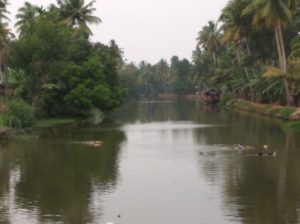16th January 2017 New Delhi, India
A sociologist in a Chem lab!
 I attended a workshop on nano- bio materials for water purification in the picturesque district of Kottayam in Kerala. It was a Newton Bhabha funded researcher link workshop led by British Council in collaboration with Royal Society of Chemistry.
I attended a workshop on nano- bio materials for water purification in the picturesque district of Kottayam in Kerala. It was a Newton Bhabha funded researcher link workshop led by British Council in collaboration with Royal Society of Chemistry.
Researcher links workshop is one of the many programs run under the ‘people’ pillar of the Newton–Bhabha Fund. As the name suggests, it helps establish a connection between experts in distant labs (within the country and across countries) who can then build links for future collaboration and help internationalise research. Considering UK’s expertise in research, it opens portals to strengthen Indian research base at par with the global standards.
Nano technology is ‘the’ thing isn’t it? It is everywhere; it literally is, given its sheer size and relevance. The workshop was to discuss nano-bio materials to remove impurities in water. Considering that only 1% of the water available on earth is drinkable scientists globally are working towards inventing the most efficient ways for water purification lest Samuel T. Coleridge’s words “water, water, everywhere, nor any drop to drink” becomes a reality!
 The workshop was hosted by Mahatma Gandhi University in partnership with Bangor University, UK. It comprised of a good mix of experts on water quality from both UK and Indian universities including Cranfield University, Oxford University, Brunel University, IIT Madras, IISc Bangalore, NIT Tiruchirappalli, Kachchh University, Central University Rajasthan, Indian Institute of Space Science and Technology and many more. The scientists, over 5 days of the workshop, showcased their work, discussed cutting-edge research and discovered how their strengths could be matched for future collaborations. It was interesting to learn about the innovative approaches using bio derived materials for purifying water. It also proved enlightening as it cleared several myths that some of us harbour for instance too much filtration of water may not be a great thing after all as it reduces the TDS levels (mineral content) giving us water that, although it pure, is devoid of essential minerals.
The workshop was hosted by Mahatma Gandhi University in partnership with Bangor University, UK. It comprised of a good mix of experts on water quality from both UK and Indian universities including Cranfield University, Oxford University, Brunel University, IIT Madras, IISc Bangalore, NIT Tiruchirappalli, Kachchh University, Central University Rajasthan, Indian Institute of Space Science and Technology and many more. The scientists, over 5 days of the workshop, showcased their work, discussed cutting-edge research and discovered how their strengths could be matched for future collaborations. It was interesting to learn about the innovative approaches using bio derived materials for purifying water. It also proved enlightening as it cleared several myths that some of us harbour for instance too much filtration of water may not be a great thing after all as it reduces the TDS levels (mineral content) giving us water that, although it pure, is devoid of essential minerals.
Water quality is a priority thematic area under Newton-Bhabha Fund and for the UK Science and Innovation Network which has undertaken considerable work in this area globally. Newton-Bhabha provides a platform to explore joint UK-India research and innovation collaborations in this area under its three pillars of – People (capacity building), Research and Translation (commercialising the research). For instance there will be a research call on water quality led by UK’s Natural Environment Research Council in partnership with Engineering and Physical Sciences Research Council and Indian Department of Science and Technology to be announced early this year. It is good to see Newton funded activities making headway towards providing solutions to global challenges – although there is still a long way to go.
So… I learnt that Azadirachta indica (Neem tree), which is abundantly found in India, is a low cost bio-absorbent, an excellent water purifier and the neem leaf powder when mixed with….no I shall not reveal the secrets of someone’s research! But the point being that a group of scientists were serious about their work and they managed to make a non-scientist and a sociologist at that, understand the complexities of chemistry in the most lucid way possible and hence it was a job well done!
For more updates on Newton-Bhabha Fund related activities kindly visit the website. Currently the following calls are open for application:-
Industry-academia partnership – India
Newton Bhabha – STEM Teacher Training workshops
Funding competition: technology solutions for society in India